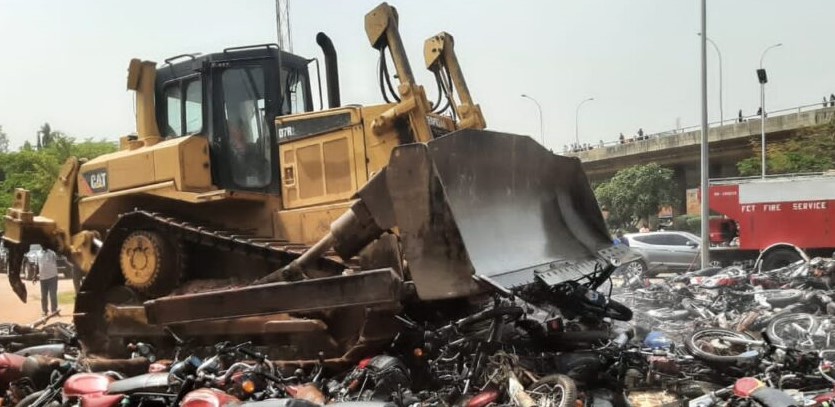Wuse Zone 2, Abuja
Monday to Friday

The Impact of Crushing Impounded Bikes and Vehicles in Nigeria
The recent crushing of over 400 impounded commercial motorcycles by the operatives of the Federal Capital Territory Administration (FCTA) joint task force team instead of auctioning them off has raised concerns about its effects on the economy.
As stated in the Leadership newspaper published on Friday, the FCT commissioner of police, Garba Haruna said the recent exercise was a sign that the law on the okada ban was still being enforced.
In this blog post, we will explore the economic consequences of this policy.
1. Loss of Potential Revenue:
Crushing impounded bikes and vehicles means missed opportunities for generating revenue through auctions. Auctions could provide a significant source of income that can be utilized for developmental projects, infrastructure improvements, and public services. This loss of revenue hampers economic growth and progress.
2. Negative Impact on the Informal Economy:
Destroying these assets disrupts the livelihoods of individuals who rely on them for repairs, sales, or transportation services. Many Nigerians rely on these assets for their livelihoods, whether it be through repairs, sales, or transportation services. Crushing these vehicles inadvertently affects the income and job opportunities within the informal sector, leading to financial struggles for individuals and reduced economic activity.
3. Distorted Market Dynamics:
Removing these vehicles from circulation can distort market dynamics, causing a decrease in supply and driving up prices. This makes it harder for people to afford means of transportation and affects sectors relying on cost-effective mobility, such as logistics, delivery services and commerce.
4. Missed Entrepreneurship Opportunities:
Auctioning impounded bikes and vehicles can serve as a starting point for aspiring entrepreneurs. They can acquire these assets at a reasonable cost, enabling them to start or expand their businesses. Auctioning the seized bikes to logistics companies, delivery service, and commerce business owners will boost the entrepreneurship spirt of aspiring entrepreneurs. By crushing these vehicles, the government denies individuals the chance to embrace entrepreneurship, hindering economic growth and innovation.
Conclusion:
The decision to crush impounded bikes and vehicles in Nigeria has far-reaching economic consequences. It results in lost revenue potential, negative impacts on livelihoods, market distortions, and missed entrepreneurship opportunities. It is essential to reconsider this policy as these may address concerns and promote a healthier economic environment. It is essential to reconsider this policy to promote economic growth, job creation, and a fair and transparent system for disposing of impounded assets.
Priscilla Abaronye
